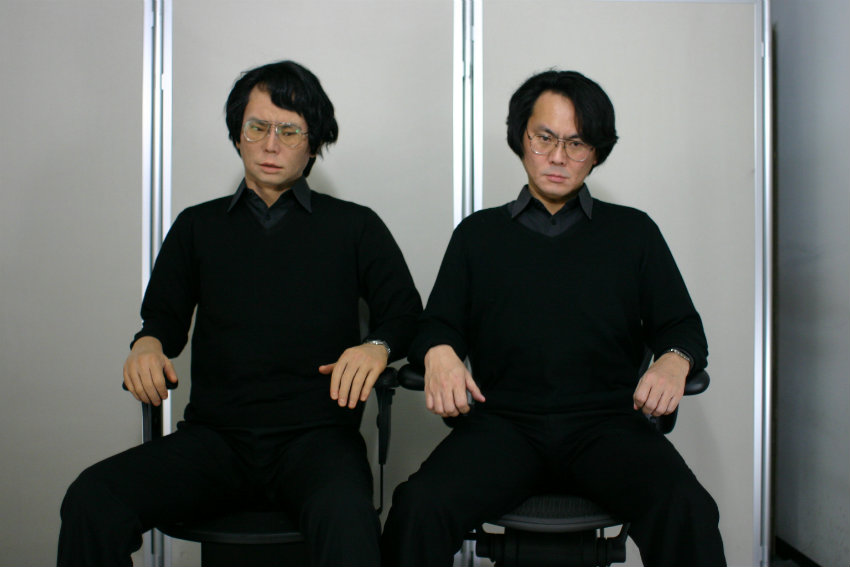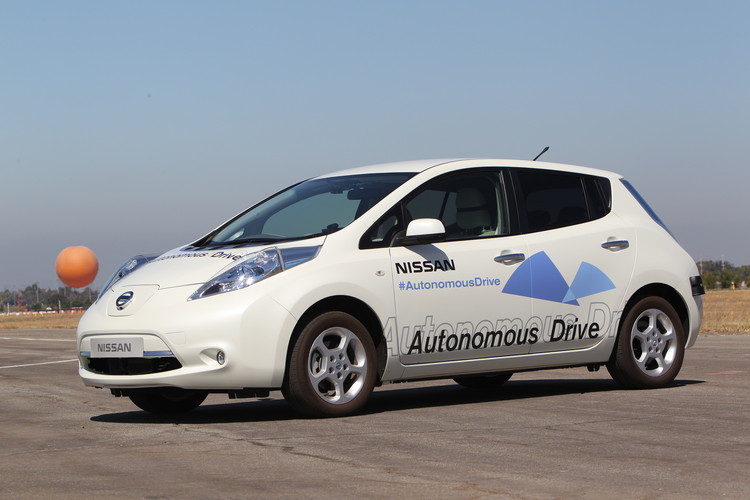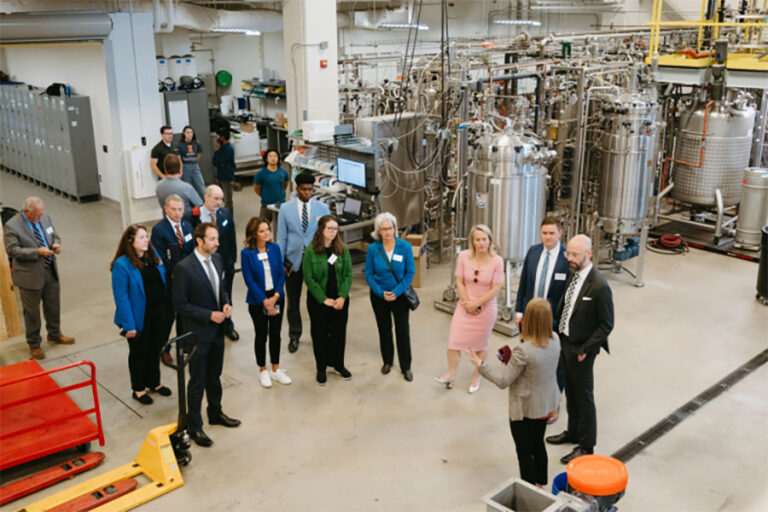Q&A with Professor Hiroshi Ishiguro, Roboticist, Osaka University
In terms of changing the relationship between humans and technology, your research overlaps with driving in some areas. How do you think autonomous driving will change the relationship?
The purpose of my research is to facilitate communication between people. My research is based on creating an ideal society by offering various forms of media to different people, so that human-to-human communication can grow and expand. To achieve this ideal, I need remote control technology and autonomous robots.

I don’t believe that the goal of autonomous driving is the technology itself. The direction autonomous driving will take differs depending on the society we aim to create. I think it’s safe to say that vehicles will not only be able to drive the instructed route but also make the driving experience fun, by suggesting different restaurants, for example, in which case the vehicle becomes something more than just a tool; it could become a partner. I think that would be ideal.
Since vehicles were originally created to be a form of transportation, another direction it could take is by coming up with a machine that would completely eliminate current restrictions such as the time and costs of commuting, and the risks. In this case, the vehicle would need to be designed to be very safe, reliable and yet unnoticeable.
The question is, is it possible to realize an infrastructure without an interface in the form of a vehicle that won’t make people feel like they are using something? Unlike trains and elevators, vehicles are operated individually, and no one would buy a vehicle if all you can do with it is drive. People want more; people want vehicles with personality. Chances are, out of the scenarios I discussed earlier that are most likely to be put into practical use, people will most likely look for personality in their vehicles.
What kind of role do you think autonomous technology will play in the future as humans and technology become even more connected?
I think that rural areas will have the most need for autonomous driving technology. Consider the elderly, and then take a look at buses, when considering the utilization of autonomous driving as a function in infrastructure.
Since buses travel fixed routes, an elderly driver may lose the freedom that comes from driving. However, if a route is mapped for all the areas they need to travel, I believe there is a way to structure a sure way to travel. On the other hand, in areas that are sparsely populated, where such infrastructure cannot be built, I believe autonomous driving technology would play the role of a partner, much like the robots we are researching. They could enjoy a happy life in the countryside, because they have a partner by their side.
If autonomous driving starts taking on the role of a partner, interactive services would be created. Our robots can automatically do uncomplicated services; however, this is not 100 percent remote-controlled. Nonetheless, androids can replace doctors in making diagnoses, and there are many things that can be done by utilizing remote control technology.
For example, some autistic children can’t speak with people but can speak with robots. Some elderly people share the same situation. In such cases, where the robots are partners for dialogue, rather than controlling everything with a computer, first volunteers can be used and then they can automatically speak during routine training. Various interactive services can be integrated into vehicles driven by elderly people in rural areas, so by being able to help in situations such as when the elderly want to learn something, or when they are in need of something, it can act as their partner. It would be nice if vehicles could be used as a tool to assure quality of life in rural areas.

How do you think people will react to new technologies coming out, such as the androids that you are researching?
People will have to learn how to use new tools and machines, so they may initially be reluctant. However, this is something that has been repeated throughout history. In addition, people will feel less resistance toward the newer technology. That is because the new technology is more human-like.
For example, if it has the ability to operate things through voice recognition, there will be no need to read the instructions, right? Technology will be more and more human-like, hence making it easier for people to use. Therefore, people will embrace it immediately. When you compare learning how to use a PC with learning how to use a smartphone, the interface on a smartphone is more creative. In other words, technology will be much easier to utilize.
Feeling resistance as a user, and society being resistant to accepting technology, are separate issues. In 10 or 20 years, voice recognition will evolve, allowing a more human-like interaction and use through speech. No one will feel resistance toward something like this. Resistance toward technology is something totally different and depends on your perspective.
With autonomous driving, it takes courage to leave the driving up to technology. Wouldn’t there be a lot of people who would hesitate to use autonomous driving?
I don’t think so. Think about getting your driver’s license. Would you rather learn to drive and get a driver’s license, or would you rather just choose autonomous driving? Nowadays, people choose to get a license to drive automatic transmissions. When I got my license, I learned to drive with manual transmission, so I was afraid to drive a car with automatic transmission. However, these days, people prefer automatic transmission.
If it is suggested that it would be better to have cruise control, then that function would become available by default. If you ask people if they prefer to acquire driving skills themselves or have something with technology drive for them, obviously people would choose the latter.

How do you plan to gain recognition of the social value of robots?
I think it is important to simply make robots more widespread. They have to be designed so that they can be utilized in different ways by using various software. This is a capability available to PCs and smartphones, but it has not yet been realized in robots. Powerful applications that can only be used by robots will need to be designed, and with this at their core, robots should become more widespread globally. I think it is only a matter of time before this kind of content becomes available.
So does that mean it must first be introduced to the masses?
I think there are two patterns here, and one would be to make it available for the masses, and the other for specific purposes. Meaning, niches where people are willing to spend any amount of money out of necessity, or where there is a problem that needs to be solved. For example, there are some patients with autism or dementia that can only converse with robots, so one way would be to start with specific purposes, such as in the medical field. There are two more ways, such as making them usable by everyone through gaming consoles, smartphones and PCs, so that people can enjoy them as different games, or suddenly just making them available at once as an infrastructure.
How do you envision the future of society as a whole 10 or 20 years from now?
It is possible that a humanoid communication robot could be popularized in two to three years. No one can predict what will happen for sure. There was a strong necessity for automobiles and refrigerators, so they were created as products. However, there is no such necessity for robots. Society will need to adapt to new technology as well, so there is a need to introduce something that is easily adaptable. Put simply, more human-like technology may be rapidly adopted. This just means older technology will be replaced with something that people can feel more affinity toward. Like the difference between the iPhone and old-school cell phones.
The same goes for cars. If autonomous cars only had the ability to take a person from one place to another, I don’t think it would change the world. Like I mentioned earlier, if the idea is to create a partner, unless it makes life fun, even in rural areas the experience would not be like the time when people switched over from cell phones to iPhones. Human brains are wired to accept something that looks human. Our hearing abilities allow us to pick up human voices, and with vision, we have many cells that respond to human-like faces. Since all human brains are made for human beings, everything made to be accepted by people will become a more intricate part of their lives![]()









